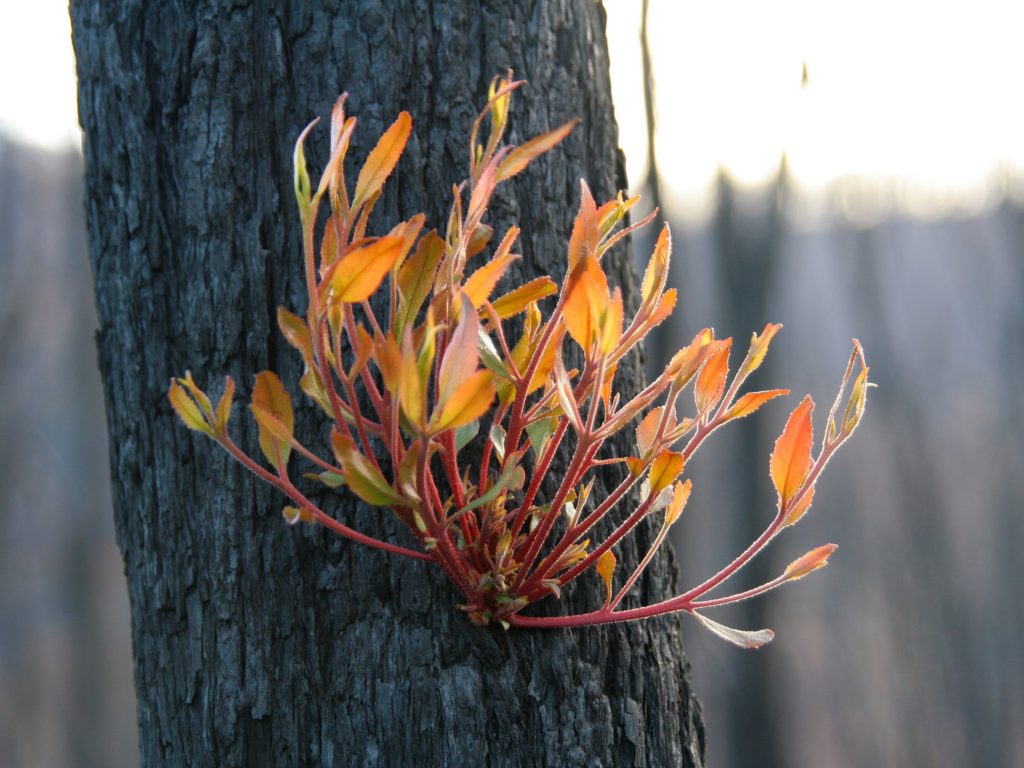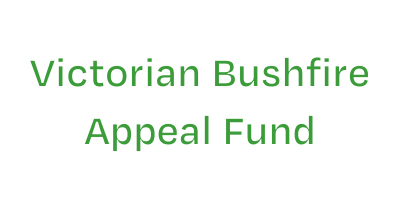Community Group Futures

The Community Group Futures program is specifically for not-for-profit organisations working in and for the benefit of communities affected by the 2009 Victorian bushfires.
These organisations continue to experience particular operational and service delivery challenges and are working in very different environments from those prior to the bushfires. The Community Group Futures program has been developed by FRRR to support these community groups.
The Community Group Futures program provides resources for organisations to consider their viability, sustainability and future roles in their communities, and to strengthen organisational capabilities to achieve their aspirations. It is an opportunity for organisations to think beyond day-to-day operations and short-term needs and look ahead to what is required to be sustainable and viable to meet the needs of the community in the years to come.

This program has now concluded.
Proudly supported by
Currently assessing
Round 10 have been awarded.
Future rounds
To be confirmed.
How to apply
Please read the information on each of the three tabs below to make sure this is the right grant for your project.
If you want to explore other grant options, please go to Find Funding Now.
I have a question, who can I talk to?
Hannah Jakab
info@frrr.org.au
1800 170 020
Confirm you are eligible to apply for this grant
To make sure this is the right grant for your community, please read the grant information below carefully. Click on each headline to reveal the detail.
What are the program objectives?
Community Group Futures aims to support the following outcomes:
- Communities enjoy access to a range of high quality, relevant and sustainable local service options.
- Not-for-profit organisations are underpinned by efficient and effective structures, systems and processes.
- Not-for-profit organisations are led and managed by skilled and capable people, whether they be volunteer or paid.
- Innovative and collaborative approaches exist to address community needs and priorities and resourcing challenges for organisations.
Is this grant available in my area?
This program is open to not-for-profit community-based organisations permanently operating in and for the benefit of communities affected by the 2009 Victorian bushfire. Eligible local LGAs and priority locations are listed below.
Eligible Local Government Areas
Following is a list of Local Government Areas (LGAs) impacted by the 2009 Victorian Bushfires. Note not all towns in LGAs were affected, and applicants will need to demonstrate that their project is supporting an impacted town / community.
- Alpine
- Horsham
- Nillumbik
- Baw Baw
- Indigo
- South Gippsland
- Cardinia
- La Trobe
- Wangaratta
- Casey
- Mitchell
- Wellington
- Greater Bendigo
- Mount Alexander
- Whittlesea
- Hepburn
- Murrindindi
- Yarra Ranges
How much funding is available? Are there priority areas?
The Community Group Futures program offers grants of up to $20,000 to eligible LGAs impacted by the 2009 Victorian Bushfires. Program funds are expected to be fully expended in 2020, bringing the program to a close.
There are three streams to the program. Organisations are encouraged to consider which stream most closely fits their needs at this point in time, with a view to supporting future viability and sustainability.
The three streams and total funds available are:
- Organisational Capability
- Viability & Sustainability
- Cost Efficiencies for Community Infrastructure
Applications can be made to only one of these streams of funding. The diagram below shows the three program streams and the types of activities and projects that funds can be used for.
| Organisational Capacity | Viability and Sustainability | Cost Efficiencies for Community Infrastructure |
| Training NFP committees / boards in governance, planning, financial management, human resource management, risk management, asset management. Paid positions. Develop and embed policies / procedures, financial systems & processes, evaluation frameworks and processes: positions need to leave a legacy within the organisation. Requests up to $15,000 for training and $20,000 for positions will be considered. | Skilled support Strategic planning Business planning and implementation support Financial analysis & planning for sustainability Shared back office services across similar geographic or service boundaries Exploring collective impact approaches to key social issues Legal support for mergers Community engagement Requests up to $20,000 to engage external expertise will be considered. | Grants For community asset cost efficiencies such as solar panels or water tanks Requests up to $10,000 will be considered. |
When assessing which stream best fits your needs, the following questions may help clarify your organisation’s needs:
- What will your organisation look like in five years’ time?
- What will your community need from your organisation?
- Will your organisation still be relevant?
- Does your organisation have what is needed to tackle challenges and grab opportunities?
- How do you measure whether you are being successful and having an impact where you want to?
What can be funded?
A broad range of charitable projects are considered under this program, including projects that:
- Strengthen resourcing / delivery capacity;
- Invest in infrastructure / equipment to increase cost efficiency;
- Support organisational skill / capability development;
- Support strategic operational planning and sustainability;
- Foster organisational networks / alliance.
What can’t be funded?
There are several areas that we can’t fund through this program. If in doubt, please contact us.
- Projects that support core business and areas of responsibility of Federal, State or Local Governments;
- Ongoing core organisational operational costs (e.g. rent, utilities, regular wages, loan repayments);
- The encouragement or advancement of sport, recreation and social activities are not considered charitable activities under Australian law. Applications from sporting organisations need to clearly demonstrate charitable outcomes and benefit to the wider community that are above and beyond the sporting activities of the club;
- Overseas travel and overseas projects;
- Prizes, gifts, trophies or awards;
- Political lobbying;
- Projects that primarily benefit private business or private interests;
- Projects solely focused on animal welfare;
- Projects that have already occurred or will occur before the grant is confirmed.
Is my organisation eligible?
- Not-for-profit community-based organisations permanently operating in and for the benefit of communities affected by the 2009 Victorian bushfires are eligible to apply. Eligible Local Government Areas and priority locations are listed above;
- Organisations with an ABN or Incorporation Certificate;
- Organisations with and without DGR endorsement;
- An organisation is eligible to submit one application per grant round;
- FRRR considers all eligible applications on their merit. Due to the volume of applications received, applications are assessed based on the documentation received at the time of application. FRRR is unlikely to follow up missing documentation after applications have been submitted;
- Projects should be undertaken between December 2020 and December 2021, as projects cannot be funded retrospectively.
Applications are welcome from any eligible organisation for any approved purpose; however, the following applications will be prioritised:
- Projects initiated and delivered by local community groups;
- Applications from communities fewer than 15,000 people;
- Organisations that do not have Deductible Gift Recipient (DGR) Tax status.
Please note, you will be considered ineligible if the:
- Application is submitted by individuals, sole traders, private or commercial businesses (as per the submitted ABN);
- Application is submitted by an organisation that is not a legal entity, without the written consent of the governing / partnering body who holds the ABN / Incorporation number;
- Application is submitted without required financial documentation (see additional information on the second tab);
- Final report/s from any FRRR grants awarded in the previous seven years have not been acquitted (delivery organisations should check with legal organisation to see if there are any outstanding final reports);
- Application is for a project or activity that has already occurred / is occurring prior to the announcement of funding;
- Application is incomplete. NOTE: Due to the volume of applications received, applications are assessed based on the documentation received at the time of application. FRRR is unlikely to follow up missing documentation after applications have been submitted.
If you need to share this information with others, you can download the guidelines above.
Gather information to support your grant application
Please read the information below to plan and prepare your project. The information below sets out what you MUST include for your project to be considered. There are plenty of helpful resources to support you along the way.
Please contact FRRR if you have any questions about the following information.
Your grant application MUST include:
Clear project information
Why is this important?
FRRR needs to clearly understand your project to assess its merits. Applicants should focus on addressing the what, when, where, who, why and how of the project, as this is the best formula to clearly communicate the details of the project.
A ready community is best placed to achieve the aims of your project, so during assessment, our staff look for
information that tells us that good leadership, skills and awareness exist in your community to support the project now and in the future.
A clear description of exactly what the grant funds will be used for, when and where the project will happen, who will benefit and who will be involved in delivering the project, why the project and grant funds are needed, how funds will be spent and how the activities and success of the project will be recorded, evaluated and shared.
Where possible, also indicate that your community is ready to deliver the project and if required, can support the initiative ongoing – i.e. awareness of need is widespread, appropriate leadership, resources, skills and knowledge exist in the community.
Helpful resources:
Financial information
Why is this important?
FRRR uses this information to understand your organisation’s ability to manage the grant funds and its financial viability.
Applications received without the requested financial information are ineligible. Providing incorrect information on financials is currently the most frequent reason why applications are not considered.
- For organisations that have audited financials: Attach the most recent annual audited statements;
- For organisations that do not have audited financials: Attach the most recent 12 months Income and Expenditure Statement. If you have a Balance Sheet, please also submit;
- For organisations less than one year old: Provide Bank Statements for the period you have been operating.
Please note:
- If financial documents are more than 18 months old, please provide an explanation as to why the organisation does not have more recent documents;
- Bank Statements are only acceptable as financial documentation if your organisation has been operating for less than one year;
- Explain any deficits and steps to sustain the organisation financially;
- Provide a brief explanation of any large financial surplus or current assets and reasons why FRRR funds are still required;
- Income and Expenditure statements must cover a full 12-month period.
- Please contact us if you cannot provide required financials or you are unsure about what to provide.
- Why is this important?
- FRRR uses this information to understand your organisation’s ability to manage the grant funds and its financial
- viability.
Project budget
Why is this important?
A clear budget helps FRRR to understand the size of your project, exactly how FRRR funds will be spent and helps demonstrate community support for your project through in-kind contributions either from your organisation or partners / community members.
You must include a project budget that clearly shows the items that FRRR grant funds will be used for and shows all income and expenses related to your project.
Budgets should be realistic and must add up – i.e. total expenditure must match total income.
Applicant contributions in cash or in-kind are highly regarded. Quotes or detailed rationale for items over $1,000 are
required, where possible. Note: FRRR suggests costing unskilled volunteer labour at $41.00 per hour.
Helpful resources:
Eligible legal entities
Why is this important?
The Strengthening Rural Communities program is only able to distribute funds to not-for-profit organisations with an ABN or Incorporation number, and FRRR needs to know that the organisation with that ABN / Incorporation number understands and agrees to carry out their responsibilities in relation to your project, if successful.
Every application needs to include an organisation that holds either an ABN or Incorporation Certificate. If your organisation doesn’t have that, FRRR could still fund the project (with your organisation as the delivery organisation) but you need another organisation’s support, which we refer to as the ‘legal organisation’.
Even though your organisation may complete the application (and will be doing the work), it’s the overarching organisation’s legal and financial information that needs to be provided. They also need to provide a letter of support, confirming they are willing to play this role.
This situation often occurs often when the organisation delivering the activity or project is a branch of an overarching organisation – such as a local CWA or YMCA branch.
Supporting materials
Why is this important?
FRRR seeks to fund projects that are well-supported by the broader local community, are locally led and delivered, show good partnerships and benefit multiple parts of the community. As FRRR is not always familiar with your community, our staff consider support material as evidence toward understanding level of community need, benefit and support.
FRRR strongly recommends that you provide supporting materials such as letters of support, community plans, survey results, photographs, media clips and research reports that can show the wider community support and partnerships involved in the project.
Large documents should be referenced and explained in the application.
Helpful resources:
Focus area
FRRR makes grants to communities, but we also need to be able to demonstrate to our funding partners where communities need support. To help us do this, we have grouped the kinds of projects communities commonly ask us to help fund into seven areas, which we call the Activity Tree:
1. Building community resilience
2. Developing organisational resilience and capacity
3. Enhancing environmental sustainability
4. Fostering cultural vibrancy
5. Lifelong learning and education
6. Economic strength
7. Improving community health and social wellbeing
Applications to the Community Group Futures program must clearly demonstrate a focus on project activity area number 2. Developing Organisational Resilience and Capacity in the Activity Tree, including projects that:
- Strengthen resourcing / delivery capacity;
- Invest in infrastructure / equipment to increase cost efficiency;
- Support organisational skill / capability development;
- Support strategic operational planning and sustainability;
- Foster organisational networks / alliance.
Need some more help?
We have a large selection of resources on our Grant Seeker Resources Page to help you along the way.
Submit your grant application via the Grants Gateway
Please contact FRRR if you have questions about any aspect of the Grants Gateway online application form.
Before you submit your application via the online Grants Gateway, please ensure you have:
Helpful resources:
It is time to submit your application. If it is helpful, you can download a copy of the application form.
Please read the instructions on how to use the Grants Gateway: Grants Gateway How-to Guide
Grants Gateway FAQs

Start a new application here.
All applications must be submitted through the online Grants Gateway.


